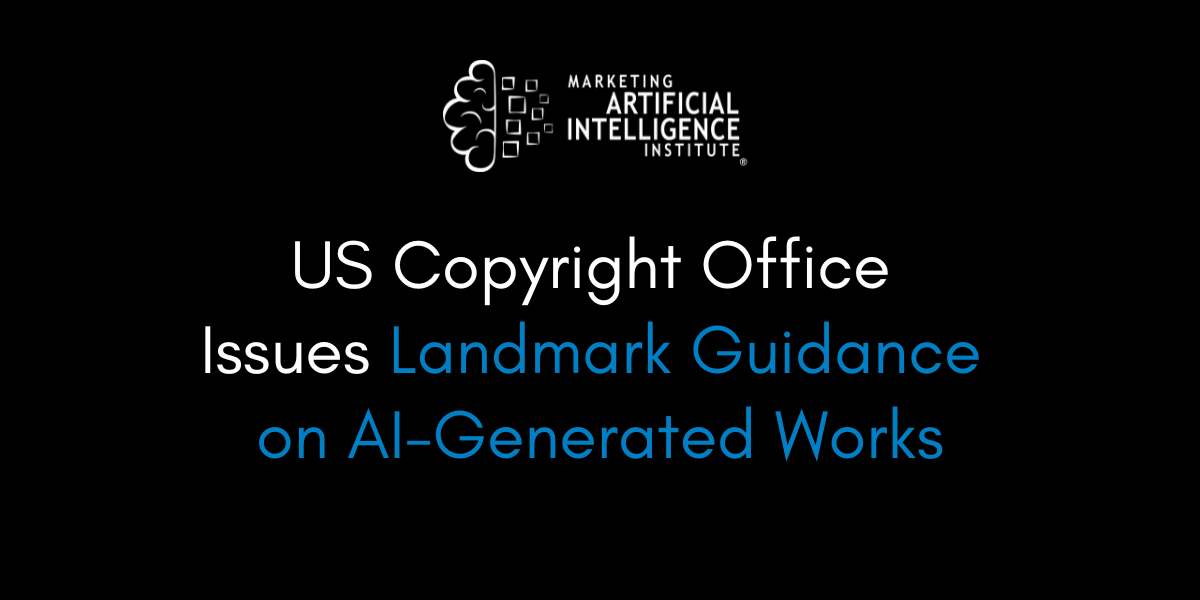In a major move that could redefine creative and commercial output, the US Copyright Office just dropped a new report clarifying how copyright law applies to content produced in part by AI.
It’s called Copyright and Artificial Intelligence Part Two: Copyrightability, and it’s the product of extensive consultations—10,000 commenters across all 50 states and 67 countries.
The big question at hand in light of the new guidance:
Can you protect AI-generated material under copyright, and how?
On Episode 134 of The Artificial Intelligence Show, me and Marketing AI Institute founder and CEO Paul Roetzer broke down what you need to know about the new guidance.
Humans Are Still the Engine of Copyright
First and foremost, the Copyright Office says no major legislative changes are needed just yet to regulate copyright in the age of AI. Under existing law, “human creativity” remains the linchpin of copyright protection.
"The use of AI tools to assist rather than stand in for human creativity does not affect the availability of copyright protection for the output," the Office writers.
Translation? If you’re using AI as a partner—not a standalone creator—you may be able to get copyright protection for some or all of the final product.
“Now it's moving more towards: as long as you remix it enough, as long as you have enough human involvement, you can actually copyright the stuff,” says Roetzer.
However, prompts alone don’t cut it. Telling ChatGPT or Midjourney to generate an image or text for you, then slapping your name on it, isn’t guaranteed to be copyrightable. You need enough human involvement—through editing, curating, remixing, rewriting, etc.—to qualify as “creative authorship.”
The Real-World Impact for Businessed
For companies creating marketing materials, content, art, or training videos that rely heavily on AI, this is a big deal. You may now have more flexibility to integrate AI outputs without voiding copyright—but it’s not a free-for-all.
Roetzer says it’s crucial to talk to intellectual property lawyers.
“Don’t go changing policies just because you read a summary,” he says. “You want an expert opinion on how this new guidance applies to your company’s specific uses of AI.”
If your team uses ChatGPT or generative AI for content, ensure they understand how much human input is required to claim copyright. Are they editing the AI output thoroughly, adding original insights, or significantly transforming it?
Do your freelancers or agencies rely on AI to produce deliverables? If so, you need to spell out in your agreements how to handle that. It’s also wise to require disclaimers about whether or not AI is being used—and how extensively.
“Be proactive here, because your team is doing things every day with generative AI and isn't considering these things,” says Roetzer.
The new Copyright Office report also acknowledges that these rules might need to evolve as AI advances. The underlying principle, however, will likely remain: Humans must bring the creativity. The more that AI outright “decides” the expressive elements, the less likely you can call it your own work.
So, while we do have a bit more clarity—and a slight loosening of what’s considered copyrightable—this definitely isn’t the final word. The AI arms race won’t slow down, and the law will keep grappling with how to manage it all.
The Bottom Line
For now, consider this your sign to huddle up with your legal team. Make sure your content creators (in-house or external) know the new guidelines. If you go the AI route, ask:
- How much am I relying on AI vs. human skill?
- Am I transforming or remixing what AI spits out?
- Does my final output reflect human creativity in a demonstrable way?
If you’re weaving your own vision, voice, or editing mastery into the output, you might just be safe to claim authorship.
Mike Kaput
As Chief Content Officer, Mike Kaput uses content marketing, marketing strategy, and marketing technology to grow and scale traffic, leads, and revenue for Marketing AI Institute. Mike is the co-author of Marketing Artificial Intelligence: AI, Marketing and the Future of Business (Matt Holt Books, 2022). See Mike's full bio.



